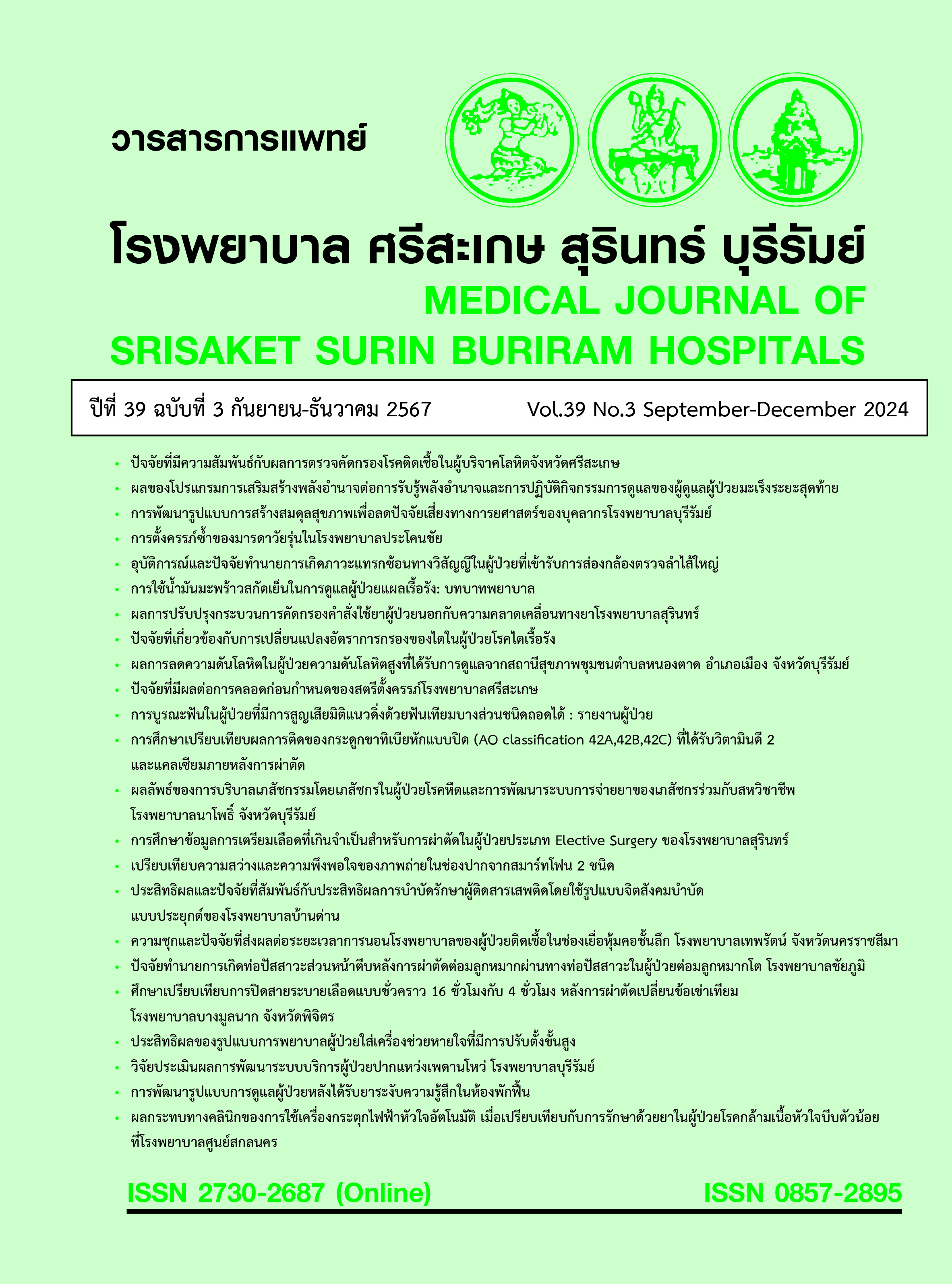The Outcomes of Pharmaceutical Care and Development of Dispensing System Collaborated by Pharmacists and Interdisciplinary Team in Na Pho hospital, Buriram Province
Main Article Content
Abstract
Background: Asthma, which is a chronic respiratory disease, impacts adversely to the quality of life of patients and caregivers leading to problem of health, social, and economic loss.
Objective: To analyze the outcomes of pharmaceutical care and develop a collaborative dispensing system collaborated by pharmacists and interdisciplinary team in the asthma clinic in Na Pho hospital, Buriram province.
Methods: This work is a comparative and retrospective study recruited total 362 cases of asthma patients. The clinical outcomes were analyzed including hospital admissions due to asthma exacerbations, readmissions within 72 hours due to exacerbations, emergency room visits due to exacerbations, and death from respiratory failure and medication-related problems. Herein, there are two statistics were used including descriptive statistics and inferential statistics of Pearson’s Chi-square test (X²) for testing in the outcomes between pre- and post-intervention groups.
Results: There were a total of 362 asthma patients including 194 patients with 89 men or 45.9% and 105 women or 54.1% in pre-intervention group and 168 patients with 56 men or 33.3% and 112 women or 66.7% in post-intervention group. The patients were mostly female. In pre-intervention, the proportion of female patients had statistically lower with p-value < 0.05 (54.1% and 66.7%, respectively). Comparing between pre- and post-intervention group, the result revealed a reduction of hospital admissions due to asthma exacerbations, from 17.0% into 8.9% (p-value < 0.05). For other outcomes, there were probably decreased, even non-statistical significances were found. Moreover, the proportion of patients requiring readmission within 72 hours was decreased from 10.3% into 5.9%, whereas emergency room visits was from 8.8% into 4.8%. Expectedly, the mortality rates were dropped from 2.1% into none. Problems with inappropriate medication usage were significantly decreased (p-value < 0.05) from 39.7% into 19.6%; however, all problems were resolved. Additionally, the proportion of patients who adhered to using inhalers increased from 88.7% into 94.6%, and the proportion of patients who passed the medication use assessment increased from 60.7% into 92.7%.
Conclusions: This study indicated that the implementation with comprehensive asthma care system of pharmaceutical care provided by pharmacists in Na Pho hospital, Buriram province could reduce inappropriate medication usage to patients and could practically decrease clinical problems, such as hospital admissions and emergency room visits.
Article Details

This work is licensed under a Creative Commons Attribution-NonCommercial-NoDerivatives 4.0 International License.
References
Gasbarro R. Helping patients cope with asthma. Pharmacy Times 1996;62:31-38.
Cochrane GM, Horne R, Chanez P. Compliance in asthma. Respir Med 1999;93(11):763-9. doi: 10.1016/s0954-6111(99)90260-3.
Owens-Harrison G, Grimm R, Gray D, Harrison OR. Evaluation of education provided by a pharmacist to hospitalized patients who used metered-dose inhaler. Hosp Pharm 1996;31(6):677-81.
Diette GB, Wu AW, Skinner EA, Markson L, Clark RD, McDonald RC, et al. Treatment patterns among adult patients with asthma: factors associated with overuse of inhaled beta-agonists and underuse of inhaled corticosteroids. Arch Intern Med 1999;159(22):2697-704. doi: 10.1001/archinte.159.22.2697.
No authors listed. Role of the pharmacist in improving asthma care. National Asthma Education and Prevention Program. Am J Health Syst Pharm 1995;52(13):1411-6. doi: 10.1093/ajhp/52.13.1411.
Robertson KE. Process for preventing or identifying and resolving problems in drug therapy. Am J Health Syst Pharm 1996;53(6):639-50. doi: 10.1093/ajhp/53.6.639.
Narhi U, Vainio K, Ahonen R, Airaksinen M, Enlund H. Detecting problems of patients with asthma in a community pharmacy: A pilot study. JSAP 1999 16(3–4):127–33.
Munzenberger PJ. Improving adherence in patients with asthma. Am Pharm 1993;NS33(8):32-7. doi: 10.1016/s0160-3450(15)30701-7.
Chapman KR, Walker L, Cluley S, Fabbri L. Improving patient compliance with asthma therapy. Respir Med 2000;94(1):2-9. doi: 10.1053/rmed.1999.0667.
Herrier RN, Boyce RW.Does counseling improve compliance? Am Pharm 1995;NS35(9):11-2, 61. PMID: 7484809
Hawkins PR. The pharmacist as a health education coordinator. Am J Health Syst Pharm 1997;54(13):1497-9. doi: 10.1093/ajhp/54.13.1497.
Pauley TR, Magee MJ, Cury JD. Pharmacist-managed, physician-directed asthma management program reduces emergency department visits. Ann Pharmacother 1995;29(1):5-9. doi: 10.1177/106002809502900101.
Watanabe T, Ohta M, Murata M, Yamamoto T. Decrease in emergency room or urgent care visits due to management of bronchial asthma inpatients and outpatients with pharmaceutical services. J Clin Pharm Ther 1998;23(4):303-9. doi: 10.1046/j.1365-2710.1998.00163.x.
Santos Dde O, Martins MC, Cipriano SL, Pinto RM, Cukier A, Stelmach R. Pharmaceutical care for patients with persistent asthma: assessment of treatment compliance and use of inhaled medications. J Bras Pneumol 2010;36(1):14-22. doi: 10.1590/s1806-37132010000100005.
ณัฐวรรธน์ เลิศภานิธิศ. ผลการบริบาลทางเภสัชกรรมผู้ป่วยโรคหืด โรงพยาบาลดอกคำใต้. วารสารวิชาการสาธารณสุข 2557;23(1):37-44.
อนัญญา สองเมือง, ธนัฎชา สองเมือง. ผลลัพธ์ของการบริบาลทางเภสัชกรรมโดยโปรแกรม SMART AsthCORD ในการดูแลผู้ป่วยโรคหืด. ศรีนครินทร์เวชสาร 2564;36(5):577-85.
อนัญญา สองเมือง, ธนัฎชา สองเมือง. ผลการบริบาลทางเภสัชกรรมในผู้ป่วยโรคหืดที่มีปัญหาการใช้ยาร่วมกับการใช้โปรแกรมคอมพิวเตอร์ในการบันทึกและส่งต่อข้อมูลผู้ป่วย. วารสารวิชาการสาธารณสุข 2563;29(5):876-83.
Ottenbros S, Teichert M, de Groot R, Griens F, Sodihardjo F, Wensing M, et al. Pharmacist-led intervention study to improve drug therapy in asthma and COPD patients. Int J Clin Pharm 2014;36(2):336-44. doi: 10.1007/s11096-013-9887-4.
Putman B, Coucke L, Vanoverschelde A, Mehuys E, Lahousse L. Community pharmacist counseling improves adherence and asthma control: a nationwide study. BMC Health Serv Res 2022;22(1):112. doi: 10.1186/s12913-022-07518-0.
Mangiapane S, Schulz M, Mühlig S, Ihle P, Schubert I, Waldmann HC. Community pharmacy-based pharmaceutical care for asthma patients. Ann Pharmacother 2005;39(11):1817-22. doi: 10.1345/aph.1G180.


